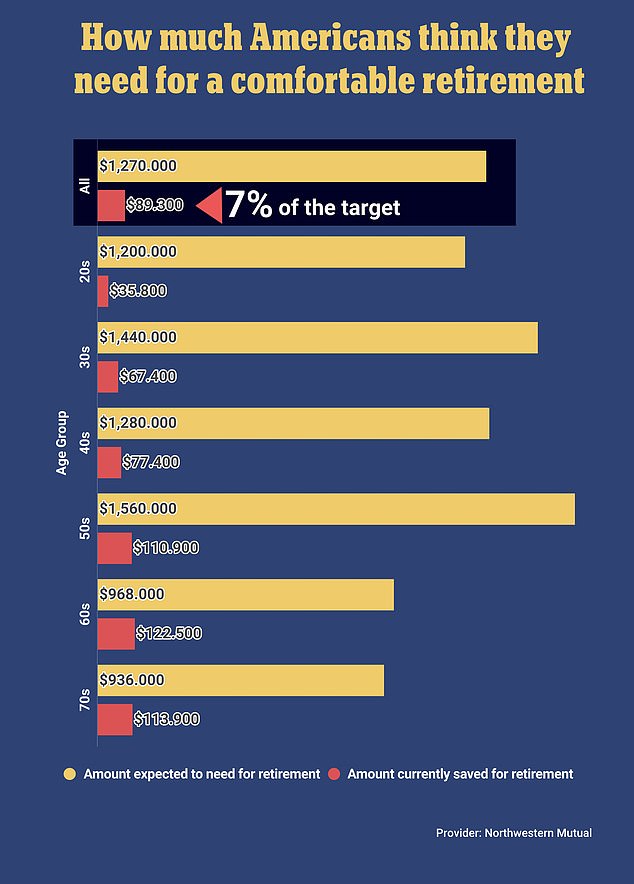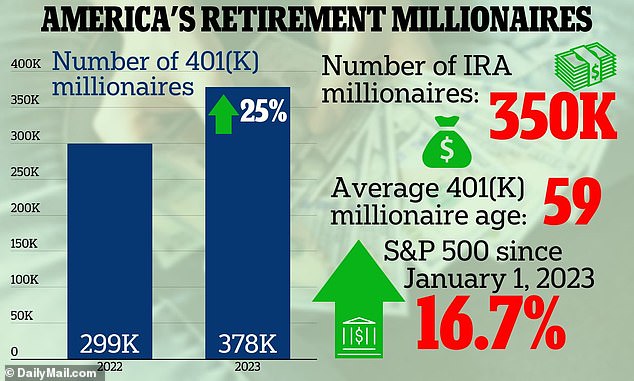Even millionaires are afraid they will outlive their retirement savings – as experts weigh in on how much is REALLY enough to retire on
A third of millionaires fear they may outlive their retirement savings, according to a new survey.
According to the latest figures, millionaires thought they would need an average of $3 million to retire comfortably findings from financial services provider Northwestern Mutual.
And of those millionaires – people with more than $1 million in investable assets – 33 percent feared running out of money later in life and 47 percent said they needed to improve their financial planning.
The study, which surveyed 2,700 American adults, found that 70 percent of wealthy Americans worked with a financial advisor — nearly double the rate of the general population, at 37 percent.
And 84 percent of wealthy people said they have a long-term financial plan that “takes into account up and down economic cycles,” compared to just 52 percent of average Americans.
According to the latest Northwestern Mutual Planning & Progress Study, a third of millionaires fear they may outlive their retirement savings

The amount people expect to need to retire comfortably varies slightly by age group. For people in their sixties and seventies, the comfortable pension amount decreases significantly, because many people in these age groups have already retired
“Rich people have an exceptionally high standard when it comes to managing their finances,” said Aditi Javeri Gokhale, chief strategy officer at Northwestern Mutual.
‘They don’t go on autopilot. Instead, they want to look much further than today. That includes the possibility of twists and turns in their financial lives.”
Meanwhile, the average amount an American adult has saved for retirement increased 3 percent from $86,869 in 2022 to $89,300, which is still less than inflation.
While $1 million was once considered a retirement benchmark, amid rampant inflation and rising interest rates, the amount needed to retire is increasing. The majority thought they would need $1.27 million to retire comfortably, and about 43 percent feared they would outlive their savings.
Overall, the average American now thinks he will have to work until age 65 to be ready for retirement, up from 64 last year.
The number of Americans with the seven-figure amount in their 401(K)s has increased 25 percent this year, according to Fidelity analysis.
Assuming someone retires at age 65 – and has a life expectancy of 90 years – this would leave them with just $40,000 a year to live on.
Yet figures from the Bureau of Labor Statistics suggest that the average American citizen aged 65 and older actually spends $52,141 per year.
Certified financial planner Marissa Reale told DailyMail.com this month: “$40,000 a year is not going to be enough to live on for most people.
‘I always advise my clients to also invest part of the money in shares. So it is not the case that you will receive the full amount in cash.
“If you really want the money to last, most people need more than $1 million.”

A stock market boom has boosted the number of savers with $1 million in their 401(k)s by 25 percent this year, according to figures from Fidelity Investments.
Northwestern Mutual found that the amount people predict they will need to retire comfortably varies slightly by age group, as does the average amount they have already saved.
Those over 50 expect to need the most ($1.56 million) and have saved an average of $110,900.
Meanwhile, twenty-somethings think they’ll only need $1.2 million later in life, even though they have just $35,800 in a 401(K) or IRA retirement account.
The comfortable retirement amount drops significantly for people in their 60s and 70s – to $968,000 and $936,000 respectively – largely because many people in these age groups have already retired.
On average, people over 60 have saved $112,500, and people over 70 have saved $113,900.
